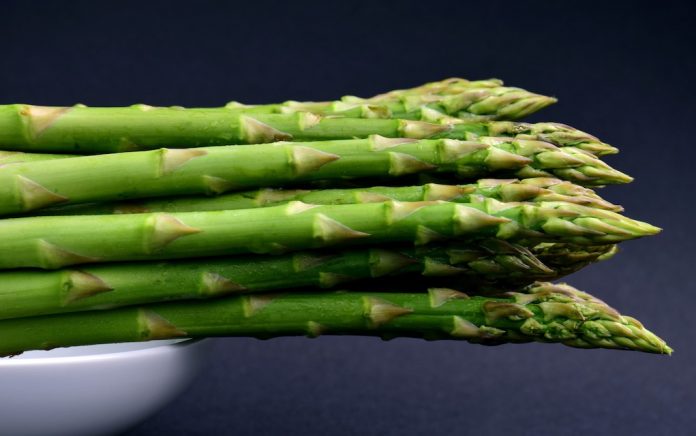
In many locations, when spring arrives the very first vegetable that pokes its head out of the ground is the asparagus. This delightful vegetable heralds in the growing season with its fleshy green stalks, each rising up about 6 to 8 inches tall. They have a regal quality, look bold and strong, but is asparagus good for you?
Although this spring vegetable is a loved food, there is something about it that makes it seem intimidating, because many people are unsure about what to do with them. That could be why people frequently question how they should eat them, how to prepare them, and then they turn to the internet to find easy asparagus recipes.
We’re going to cover all of these issues right here. Let’s begin with the topic question.
Is asparagus good for you?
We give a resounding “yes” to this question, and here’s why. One reason is their wealth of nutrients. Just one cup of cooked asparagus provides about 40 calories and the following Daily Recommended Intake (DRI)/%Daily Value (DV) of:
- Vitamin K: 101%
- Folate: 67%
- Copper: 33%
- Thiamin (vitamin B1): 24%
- Selenium: 20%
- Riboflavin (vitamin B2): 19%
- Vitamin E: 18%
- Vitamin C: 18%
- Phosphorus: 14%
- Fiber: 13%
- Protein: 9%
- Iron: 9%
- Also good amounts of potassium, vitamin B6, magnesium, and calcium
What are the health benefits of asparagus?
- These stalks contain a unique combination of both anti-inflammatory and antioxidant compounds. For example, saponins and flavonoids are essential anti-inflammatory compounds found in high levels in asparagus. Foods that are high in antioxidants and anti-inflammatory substances support optimal body functioning and have the potential to lower the risk of heart disease, cancers, and type 2 diabetes.
- This delicious vegetable supports your digestive system in a way few others can. That’s because it contains an impressive amount of natural inulin, a carbohydrate that is also a prebiotic. The role of prebiotics is to nourish probiotics that are in your digestive tract, which in turn helps them thrive and maintain a balanced intestinal tract and supports overall health.
- If you are looking for help with diabetes, this is your veggie. The fiber stabilizes blood sugar to prevent cravings and mood swings.
- Asparagus are a rich source of glutathione, a substance that helps break down cancer-causing compounds and free radicals. Therefore, eating this veggie may help protect against certain cancers, such as bone, breast, colon, and lung.
Asparagus benefits for men
Did you know there are asparagus benefits for men? Here’s the deal. Asparagus are high in folate, which triggers the production of histamine, and histamine is necessary to achieve orgasm.
The presence of folate plus the vitamin B6 are also good for boosting libido. In addition, the vitamin E stimulates testosterone in men.
Why are asparagus different colors?
You can find this spring vegetable in three different colors: green, white, and purple. The growing conditions determine which color you get. For example:
- Green stalks have used their chlorophyll pigments to capture sunlight
- Most green asparagus varieties transform into white if they are grown with the soil mounded up to surround the growing shoots and protect them from the sun.
- Purple asparagus credit their color to flavonoids called anthocyanin pigments
How to prepare asparagus
When you bring your stalks home from the market or if you pick them in your garden, place the cut ends in a dish with some water or wrap them in a wet towel. Be sure to prepare and eat them within 48 hours or they will become wilted and less tasty.
Once you retrieve them from the fridge, you're ready to cook! Basically, the best ways to enjoy asparagus are grilled, steamed, or roasted. Serve them with your favorite seasonings, be it citrus, oil and vinegar, herbs and spices, or a light sauce.
Easy asparagus recipes. The following two recipes are super easy and delicious! Give them a try and let us know what you think.
Easy Asparagus
- 1 lb medium asparagus, cut off tough ends and slice the stalks at a diagonal in 2-inch pieces
- 2 Tbs extra virgin olive or avocado oil
- 1 tsp lemon zest
- Handful of fresh cilantro
- Salt and pepper to taste
Fill a medium saucepan halfway with lightly salted water. Bring to a boil and blanch the asparagus. Lower the heat to maintain a simmer. Simmer for 2 minutes. Remove immediately from heat and drain. Place the hot asparagus in a bowl and add all of the remaining ingredients. Toss and serve.
Roasted Asparagus and Sauce
- 1 lb fresh asparagus, tough ends cut off
- 1 Tbs extra virgin olive or avocado oil
- 2-4 cloves garlic, minced (to taste)
- 1 Tbs flour
- 4-6 oz non-dairy beverage, unsweetened
- Dash of turmeric
- Salt and pepper to taste
Preheat oven to 400 degrees Fahrenheit. Place the asparagus on a baking sheet lined with parchment paper. Sprinkle with salt and pepper. Roast for 15-18 minutes until tender. While they are roasting, saute garlic in a small pot for one minute. Whisk in the flour for an additional one minute, then add most of the nondairy beverage, salt, pepper, and turmeric. Whisk and bring to a simmer. Remove from heat. Add more nondairy beverage if the sauce is too thick. Drizzle the sauce over the asparagus immediately after taking them out of the oven.
Be sure to share your favorite asparagus recipes with us!
Read this next
Made by Me: Garlicky Roasted Asparagus
The World's Most Antioxidant Rich Foods
13 Reasons to Eat Berries (Right Now!)
Sources
Forberg C. 5 powerful health benefits of asparagus you probably didn’t know. Eating Well
George Mateljan Foundation. Asparagus
Men’s Health. 4 reasons to eat asparagus. 2009 Sep 6










